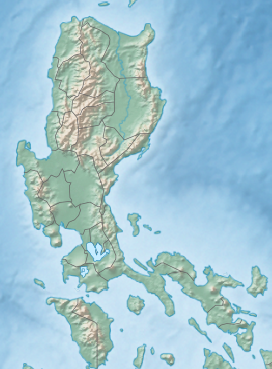Mount Samat (Tagalog pronunciation: [samat]) is a mountain in the town of Pilar, Bataan, Philippines. Located near its summit is the Mount Samat National Shrine, a national shrine dedicated to the fallen Filipino and American fallen during World War II.
| Mount Samat | |
|---|---|
 Mount Samat remote view | |
| Highest point | |
| Elevation | 560 m (1,840 ft)[1] |
| Prominence | 218 m (715 ft) |
| Parent peak | Mount Mariveles |
| Coordinates | 14°36′15.4″N 120°30′27.3″E / 14.604278°N 120.507583°E |
| Geography | |
| Location | Luzon |
| Country | Philippines |
| Region | Central Luzon |
| Province | Bataan |
| Municipality | Pilar |
| Parent range | Zambales Mountains |
| Geology | |
| Mountain type | Extinct volcano |
| Volcanic arc/belt | Western Bataan Lineament |
| Last eruption | Unknown |
| Climbing | |
| Easiest route | Mt. Samat Road[1] |
Geology
editMount Samat is a parasitic cone of Mount Mariveles with no record of historical eruption. The summit of Mount Samat is 9.2 km (5.7 mi) NNE of the Mariveles caldera.[2] Mount Samat itself has a 550-metre (1,800 ft) wide crater that opens to the northeast. The Mount Samat Cross is situated near the edge of the crater rim.[1]
Historical significance
editAt the start of World War II in 1942 after suffering heavy losses against the Imperial Japanese Army all over Luzon, the Filipino and American soldiers retreated to Bataan Peninsula to regroup for a last valiant but futile stand. After four months of fighting, the 78,000 exhausted, sick and starving soldiers under Major General Edward P. King surrendered to the Japanese on April 9, 1942, known as the fall of Bataan. It is the single largest surrender of U.S. soldiers in history and Mariveles, a town in the Bataan province, was their last stronghold after which, together with the Philippine soldiers, they were led on to the 80-mile (130 km) march to Capas, Tarlac known as the Bataan Death March.
The Mount Samat National Shrine was erected as a memorial to the Filipino and American soldiers who fought against the Imperial Japanese Army in World War II.[3]
Dunsulan Falls
editDunsulan Falls (14°36′52.7″N 120°29′33.8″E / 14.614639°N 120.492722°E) is a waterfall located at the foot of Mount Samat, northeast of the National Shrine in Brgy Liyang, also in Pilar town.[4] Dunsulan falls and river is the main drainage on the crater side of Mount Samat.
Gallery
edit-
Mount Samat viewed from Orion, Bataan
-
View from Mount Samat
-
Steep pathway leading to the Shrine's Memorial Cross
References
edit- ^ a b c "Mount Samat, Cantral Luzon, Philippines". Google Maps. Retrieved on June 8, 2012.
- ^ "Mariveles Synonyms & Subfeatures". Global Volcanism Program. Retrieved on June 8, 2012.
- ^ Government of Province of Bataan (2006)."Dambana ng Kagitingan" Archived March 18, 2012, at the Wayback Machine. Bataan...A Raging Peninsula. Retrieved on March 27, 2011.
- ^ "Historical trails: Mt. Samat". Pinoy Mountaineer. Retrieved June 8, 2012.
External links
edit- Media related to Mount Samat at Wikimedia Commons
- Photo of Dunsulan Falls from Panoramio

